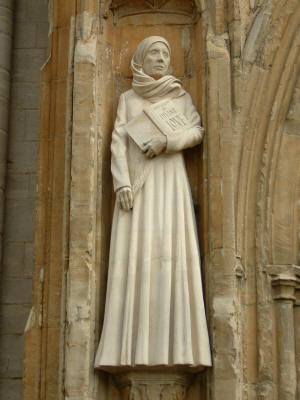| Julian of Norwich (c.1342- after 1416) St.
Julian's Church lies on St. Julian's Alley - a small
lane which connects King Street to Rouen Road. It was
here that she wrote her book The Revelations of
Divine Love in a cell attached to the south wall of
the original church. The
church was badly damaged during WW2 bombing and was
substantially rebuilt.

Statue of Julian of
Norwich by David Holgate
Julian was the first woman to write a book in
English. It is likely that she was associated with Carrow Priory and may have been educated by the nuns
there. (The remains of the priory now stand on land owned by Reckitt
and Colman but are not accessible to the public.)
When she was 30 years old Julian became severely ill
and during this time received a number of visions or
'showings' -
which she later wrote down. After recovering from her
illness she spent many years pondering the significance
of her visions. She taught that God should
be seen as loving and that our suffering
should not be viewed as God's punishment but as a means
of understanding him more fully. Her writings have had a
profound influence on Christian thought ever since.
She wrote two accounts of her 'showings': an earlier
short version and a second longer version. One of her famous lines: 'And all shall be well and all manner of
thing shall be well ' was incorporated by T.S. Eliot in the concluding
section of Little Gidding in The Four Quartets.
(Read Julian's All
Shall Be Well)
In later life Julian lived as a anchoress in the
church and took her name from it. (Her real name is
unknown.)
There is a new statue of Julian by the west door of Norwich cathedral - which was carved
by the sculptor David Holgate. Accommodation for those wishing to
visit the church is available at All Hallows House which
lies next to the church. |

